
Content created: 2009-01-30
File last modified:

These appendices, in the same order given here, are normally appended to the text for the tenth court, of which they are considered a part.
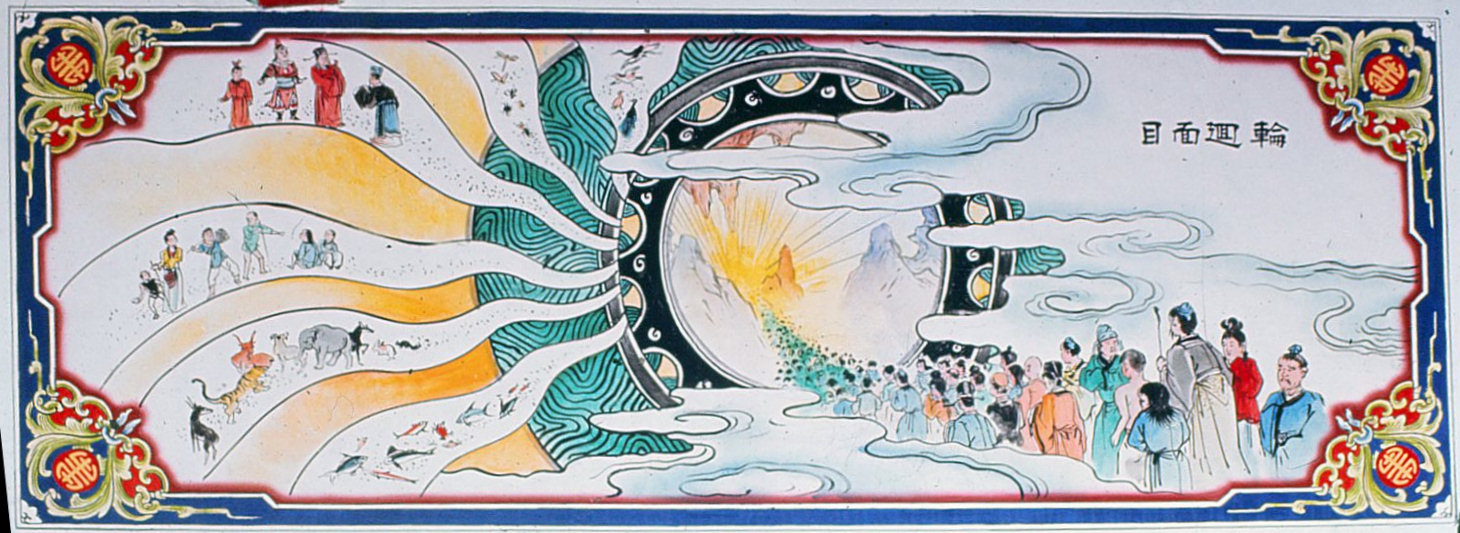
| The Hall of the Great Wheel is 101,200 miles in extent, |
转劫所地方宽一万一千二百里(七百由旬),
Zhuǎn Jié Suǒ dìfang kuān yīwàn yīqiān èrbǎi lǐ (qībǎi yóu xún), 轉劫所地方寬一萬一千二百里(七百由旬), |
| enclosed on all sides by an iron palisade. |
周围上下都是铁的栅栏。
zhōuwéi shàngxià dōu shì tiě de zhà lán. 周圍上下都是鐵的柵欄。 |
| Within are eighty-one subdivisions, each of which has its judges and officers to keep records. |
其中分八十一个处所。每一各处所都有亭台,并有判官、官吏设案纪事。
Qízhōng fēn bāshí yī gè chùsuǒ. měi yī gèchù suǒ dōu yǒu tíng tái, bìng yǒu pànguān, guānlì shè àn jì shì. 其中分八十一個處所。每一各處所都有亭臺,並有判官、官吏設案紀事。 |
| Beyond the palisade there is a labyrinth of 108,000 paths leading by direct and circuitous routes back to earth. |
栅栏外,另有羊肠样的细小道路,共有十万八千条,盘旋弯曲地通往四大部洲。
Zhàlan wài, lìngyǒu yángchángyàng de xìxiǎo dàolù, gòngyǒu shí wàn bāqiān tiáo, pánxuán wānqū dì tōngwǎng Sìdà bù zhōu. 柵欄外,另有羊腸樣的細小道路,共有十萬八千條,盤旋彎曲地通往四大部洲。 |
| Inside it is so dark that stretching out one's hand, one cannot see one's fingers |
路上暗得伸手不见五指,
Lùshang àn dé shēnshǒu bù jiàn wǔzhǐ, 路上暗得伸手不見五指, |
| and through it pass the spirits coming and going. |
众鬼死生投胎,进出都走此路。
zhòng guǐ sǐ shēng tóutāi, jìnchū dōu zǒu cǐ lù. 衆鬼死生投胎,進出都走此路。 |
| But to one who looks from the outside everything is seen as clear as crystal, |
可是由外望入,却又亮如水晶,
Kěshì yóu wài wàng rù, quèyòu liàng rú shuǐjīng, 可是由外望入,卻又亮如水晶, |
| and one sees not a trace of what is within. |
所有情事丝毫隐藏不得。
suǒyǒu qíngshì sīháo yǐncáng bude. 所有情事絲毫隱藏不得。 |
| The judges assign officials and demon soldiers assigned to guard duty. |
判官派遣官吏、鬼卒,轮班把守。
Pànguān pài qiǎn guānlì, guǐzú, lúnbān bǎshǒu. 判官派遣官吏、鬼卒,輪班把守。 |
| The spirits coming and going all have the faces and features they had while alive and are easily recognized. |
各鬼进进出出,都按初生本来面目,很容易可以分辨。
Gè guǐ jìn jìnchū chū, dōu àn chūshēng běnlái miànmù, hěn róngyì kěyǐ fēnbiàn. 各鬼進進出出,都按初生本來面目,很容易可以分辨。 |
| The judges and attendants are chosen from very virtuous people |
所有掌理这些事务的判官、官吏,都是在世
Suǒyǒu zhǎnglǐ zhè xiē shìwù de pànguān, guānlì, dōu shì zàishì 所有掌理這些事務的判官、官吏,都是在世 |
| who in life were noted for filial piety, friendship to siblings and elders, harmony with relatives and friends, who did not take life, but freed animals. |
孝顺父母、友爱兄长,和睦亲友,同时行戒杀、放生的大善人。
xiàoshùn fùmǔ, yǒu'ài xiōngzhǎng, hémù qīnyǒu, tóngshí xíng jièshā, fàngshēng de dà shànrén. 孝順父母、友愛兄長,和睦親友,同時行戒殺、放生的大善人。 |
| After death they were sent here to look after the transmigration of souls, the turning of the kalpa, and such duties. |
死后送入此所,查办所有轮回、转劫等事务。
Sǐhòu sòngrù cǐ suǒ, chábàn suǒyǒu lún huí, zhuǎn jié děng shìwù. 死後送入此所,查辦所有輪迴、轉劫等事務。 |
| If for a space of five years they make no mistakes they are promoted to a higher office and rewarded; |
办过五年后,假如没错误,就加级、调升,予以奖励;
Bàn guò wǔ nián hòu, jiǎrú méi cuòwù, jiù jiājí, diàoshēng, yǔyǐ jiǎnglì; 辦過五年後,假如沒錯誤,就加級、調升,予以獎勵; |
| but if found to be lazy or domineering or willful |
假如怠惰,或者专权跋扈、刚愎自用;
jiǎrú dàiduò, huòzhě zhuānquán báhù, gāngbì zìyòng; 假如怠惰,或者專權跋扈、剛愎自用; |
| or do not carry out what has been decided in an appropriate meeting of the judges and officials |
不配合所有判官、官吏妥善会议后决定办理的发放事宜;
bùpèi hé suǒyǒu pànguān, guānlì tuǒshàn huìyì hòu juédìng bànlǐ de fāfàng shìyí; 不配合所有判官、官吏妥善會議後決定辦理的發放事宜; |
| or through oversight allow a ghost to be left out of a list, or to escape, or to hide |
或者有失察、致鬼犯漏列、逃走、隐匿的话,
huòzhě yǒu shīchá, zhì guǐ fàn lòu liè, táozǒu, yǐnnì dehuà, 或者有失察、致鬼犯漏列、逃走、隱匿的話, |
| then they are reported for demotion or censure. |
则奏请降职、贬官。
zé zòuqǐng jiàngzhí, biǎn guān. 則奏請降職、貶官。 |
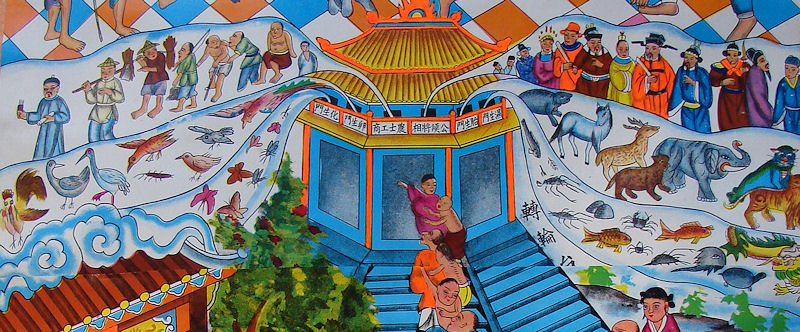
| Those who in life have been unfilial or have destroyed much life, |
凡是在世不孝、及杀生繁多的凶魂,
Fánshì zàishì bùxiào, jí shāshēng fánduō de xiōng hún, 凡是在世不孝、及殺生繁多的凶魂, |
| when they have been tortured in the various Courts |
受过各殿的地狱所施加的苦刑后,
shòu guò gè diàn de dìyù suǒ shījiā de kǔxíng hòu, 受過各殿的地獄所施加的苦刑後, |
| are brought to the Hall of the Great Wheel |
经发交转劫所内的,
jīng fājiāo zhuǎn jié suǒ nèi de, 經發交轉劫所內的, |
| and first beaten to death with peach twigs. |
先用桃花枝抽打致死。
xiān yòng táohuā zhī chōudǎ zhìsǐ. 先用桃花枝抽打致死。 |
| They then become jiàn, and with changed heads and altered faces |
死后化为聻,将他改头换面,
Sǐhòu huàwéi jiàn, jiāng tā gǎitóu huànmiàn, 死後化爲聻,將他改頭換面, |
| they are turned out into the labyrinth to proceed by the path which ends in the birth of animals. |
发进羊肠小路,投生为畜生。
fā jìn yángcháng xiǎolù, tóushēng wéi chùshēng. 發進羊腸小路,投生爲畜生。 |
| Birds, beasts, fishes, and insects may after many myriads of kalpas again resume their original shapes; |
所有的禽兽、鱼虫,要经过上万、上千、上百次沦堕的劫难,才能受苦期满。
Suǒyǒu de qínshòu, yúchóng, yào jīngguò shàngwàn, shàngqiān, shàngbǎi cì lún duò de jiénàn, cáinéng shòukǔ qīmǎn. 所有的禽獸、魚蟲,要經過上萬、上千、上百次淪墮的劫難,才能受苦期滿。 |
| thus animals with wombs, like cows and horses, or animals that lay eggs like dragons, tortoises, snakes, and birds; |
像胎生的牛马等禽兽;卵生的龙龟蛇鸟;
xiàng tāishēng de niúmǎ děng qínshòu; luǎnshēng de lóng guī shé niǎo; 像胎生的牛馬等禽獸;卵生的龍龜蛇鳥; |
| might become butterflies, honeybees, maggots, and so on, |
湿化生的蝴蝶、蜜蜂、蛆虫之类,
shī huàshēng de húdié, mìfēng, qūchóng zhīlèi, 濕化生的蝴蝶、蜜蜂、蛆蟲之類, |
| all receiving the results of the ever-turning wheel |
都是不断地轮回受报,
dōu shì bùduàn de lúnhuí shòu bào, 都是不斷地輪回受報, |
| and if any do not escape within four lifetimes |
在此四生中,不得出离,
zàicǐ sì shēng zhōng, bude chū lí, 在此四生中,不得出離, |
| then at kalpa's end |
等到劫数已满,
děngdào jiéshù yǐ mǎn, 等到劫數已滿, |
| if there are any that during three existences did not destroy life, |
若能连续三世不伤生物之命,
ruò néng liánxù sānshì bù shāngshēng wù zhī mìng, 若能連續三世不傷生物之命, |
| they may be born amongst human beings as a reward, |
方可使再投生为人。
fāng kě shǐ zài tóushēng wéirén. 方可使再投生爲人。 |
| For these animals reborn as humans a clear description is made |
这些由动物投生为人的,均叙述明白,
Zhè xiē yóu dòngwù tóushēng wéirén de, jūn xùshù míngbai, 這些由動物投生爲人的,均敍述明白, |
| and noted in a book, which is forwarded to the First Court |
记在册籍上,奏呈给第一殿,
jì zài cè jí shàng, zòu chéng gěi dìyī diàn, 記在冊籍上,奏呈給第一殿, |
| where the opportunities and happiness of the next life are decided. |
批注判定其来生的因缘、福报。
pīzhù pàndìng qí láishēng de yīnyuán, fú bào. 批註判定其來生的因緣、福報。 |
| But all shades to be born as men and women |
再发往生到四大洲中,出生为男子、女人。
Zàifā wǎngshēng dào Sìdà zhōu zhōng, chūshēng wéi nánzǐ, nǚrén. 再發往生到四大洲中,出生爲男子、女人。 |
| must first proceed to the Terrace of Drunken Oblivion. |
发放之前,要先交醧忘台下。
fāfàng zhī qián, yào xiānjiāo YùwàngTái xià. 發放之前,要先交醧忘臺下。 |
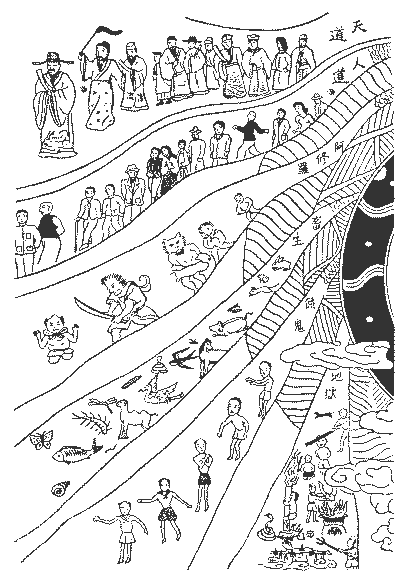
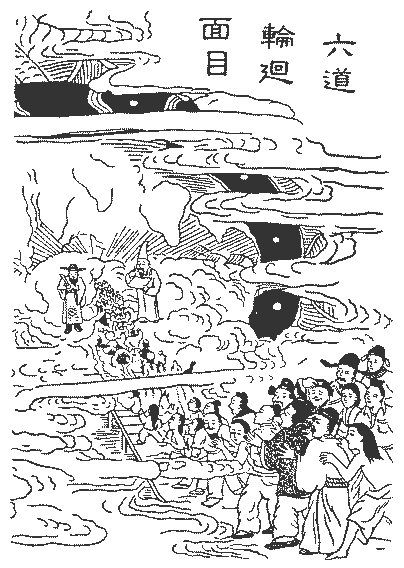
| The Terrace of Drunken Oblivion is overseen by Grandmother Mèng |
醧忘台为孟婆神所管理。
Yùwáng Tái wéi Mèng pó shén suǒ guǎnlǐ. 醧忘臺爲孟婆神所管理。 |
| Grandmother Mèng was born in the Earlier (Western) Hàn Dynasty. |
孟婆神生于西汉,
Mèng pó shén shēng yú Xīhàn, 孟婆神生於西漢, |
| In her childhood she studied the Four Books and Five Scriptures of the Confucian school; |
幼年时即熟读儒家的四书、五经;
yòunián shí jí shúdú Rújiā de Sìshū, Wǔjīng; 幼年時即熟讀儒家的四書、五經; |
| and devoted herself to seriously chanting Buddhist scriptures. |
并庄敬地诵读佛经。
bìng zhuāng jìng dì sòngdú Fójīng. 並莊敬地誦讀佛經。 |
| In this she immersed herself until she became unaware of what was past |
修到:凡是过去的事不思;
Xiū dào: fánshì guòqù de shì bù sī; 修到:凡是過去的事不思; |
| and had no care about the future, |
未来的事不想的境地。
wèilái de shì bùxiǎng de jìngdì. 未來的事不想的境地。 |
| but occupied herself in exhorting mankind to desist from taking life and to become vegetarians. |
在世时,专心壹志地劝人戒杀、吃素。
zàishì shí, zhuānxīn yī zhì dì quàn rén jièshā, chīsù. 在世時,專心壹志地勸人戒殺、吃素。 |
| At eighty-one years of age, though her hair was white, her complexion was clear as a child's. |
年八十一岁时,童颜鹤发,
Nián bāshí yī suì shí, tóngyán-hèfà, 年八十一歲時,童顔鶴髮, |
| She was pure throughout her life, unblemished in her virginity. |
始终守精,未损童贞。
shǐzhōng shǒu jīng, wèi sǔn tóngzhēn. 始終守精,未損童貞。 |
| The only name she knew for herself was her surname Mèng. |
只知道自己姓孟,
zhǐ zhīdào zìjǐ xìng mèng, 只知道自己姓孟, |
| but men called her " Granny Mèng." |
当时的人都称她“孟婆阿奶”。
dāngshí de rén dōu chēng tā "Mèng pó ānǎi". 當時的人都稱她“孟婆阿奶”。 |
| She retired to the hills and lived as a religious hermit until the Later (Eastern) Hàn. |
后入山修真,一直到东汉时仍在。
Hòu rùshān xiūzhēn, yīzhí dào Dōnghàn shí réng zài. 後入山修真,一直到東漢時仍在。 |
| Then certain people, especially sensitive, were able to understand the causes and effects in their previous lives, |
世人有人由于灵机深厚,能够知晓前世的因果,
Shìrén yǒu rén yóuyú língjī shēnhòu, nénggòu zhīxiǎo qiánshì de yīnguǒ, 世人有人由於靈機深厚,能夠知曉前世的因果, |
| and liked to beguile others and play tricks, and they revealed secrets of the netherworld, |
因为喜欢耍弄智巧、术数,露了阴间的天机。
yīnwèi xǐhuan shuǎnòng zhìqiǎo, shùshù, lù le yīnjiān de tiānjī. 因爲喜歡耍弄智巧、術數,露了陰間的天機。 |
| until their former family members recognized them from their previous existence, and worldly affairs thus became confounded. |
致令世间人妄认前生的眷属,扰乱了世情。
zhì lìng shìjiān rén wàng rèn qiánshēng de juànshǔ, rǎoluàn le shìqíng. 致令世間人妄認前生的眷屬,擾亂了世情。 |
| So his celestial majesty the Jade Emperor ordered Granny Mèng to become a goddess in the afterworld |
因此玉皇大天尊命孟婆阿奶为幽冥之神,
Yīncǐ Yùhuáng dà tiānzūn mìng Mèng pó ānǎi wéi yōumíng zhī shén, 因此玉皇大天尊命孟婆阿奶爲幽冥之神, |
| and to construct the Terrace of Drunken Oblivion, and he permitted the selection of ghostly officials to assist her and carry out her commands. |
建造醧忘台,准予选拔鬼吏供使唤。
jiànzàoYùwáng Tái, zhǔnyǔ xuǎnbá guǐ lì gōng shǐhuan. 建造醧忘臺,准予選拔鬼吏供使喚。 |
| The souls which the tenth court has declared should be reborn as humans |
将第十殿所拟定,发往何地为人的鬼魂,
Jiāng dì-shí diàn suǒ nǐdìng, fā wǎng hédì wéirén de guǐhún, 將第十殿所擬定,發往何地爲人的鬼魂, |
| [are made to] consume an herbal decoction, neither liquor nor non-liquor, |
用采自俗世的药物,合成似酒非酒的汤,
yòng cǎi zì súshì de yàowù, héchéng sì jiǔ fēi jiǔ de tāng, 用採自俗世的藥物,合成似酒非酒的湯, |
| made in five flavors: sweet, bitter, acrid, sour, or salt. |
分为甘苦辛酸咸五味。
fēnwéi gānkǔ xīnsuān xián wǔwèi. 分爲甘苦辛酸鹹五味。 |
| All ghosts, before they are reincarnated, are forced to consume this elixir |
所有的鬼魂在转世前,派饮此汤,
suǒyǒu de guǐhún zài zhuǎnshì qián, pài yǐn cǐ tāng, 所有的鬼魂在轉世前,派飲此湯, |
| making them forget everything about their former lives. |
使忘记前生的事,
shǐ wàngjì qiánshēng de shì, 使忘記前生的事, |
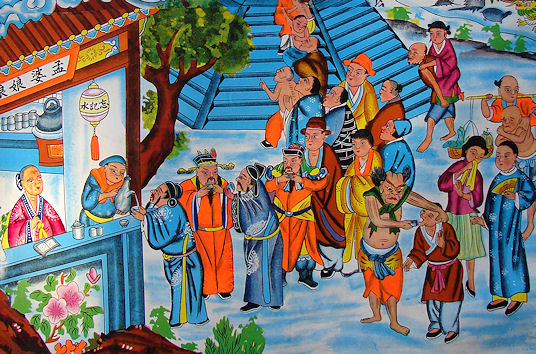
| They (instead) carry with them to the next life only slight influences such as |
药力同时带往阳间,
Yàolì tóngshí dàiwǎng yángjiān, 藥力同時帶往陽間, |
| the mouth watering when the spleen is impaired [by anger], |
令其或因多思伤脾而流涎;
lìng qíhuò yīn duō sī shāng pí ér liúxián; 令其或因多思傷脾而流涎; |
| laughter inducing perspiration, |
或因多喜多笑而多汗;
huò yīn duō xǐ duō xiào ér duō hàn; 或因多喜多笑而多汗; |
| or worry producing tears |
或因多虑多忧而流涕;
huò yīn duōlǜ duō yōu ér liútì; 或因多慮多憂而流涕; |
| anger inducing sobs, |
或因多怒而流泪;
huò yīn duō nù ér liúlèi; 或因多怒而流淚; |
| or spitting from nervousness. |
或因惊恐而流唾。
huò yīn jīngkǒng ér liú tuò. 或因驚恐而流唾。 |
| Each (flavor?) brings one, two, or three such weaknesses. |
各令带一分、二分、三分的病。
Gè lìng dài yīfēn, èrfēn, sānfēn de bìng. 各令帶一分、二分、三分的病。 |
| For good people, the eye nose, tongue, and four limbs will be made more refined, brighter, stronger, and healthier. |
在世为善的人,令其眼耳鼻舌四肢较以往更精、更明、更強、更健。
Zàishì wéi shàn de rén, lìng qí yǎn ěr bí shé sìzhī jiào yǐwǎng gèng jīng, gèng míng, gèng qiáng, gèng jiàn. 在世爲善的人,令其眼耳鼻舌四肢較以往更精、更明、更強、更健。 |
| But evil people's voices, intelligence, spirits, and ambition will be used up and gradually grow feeble. |
作恶的人使其声音、神智、魂魄、精志消耗,逐渐疲惫衰弱;
Zuò'è de rén shǐ qí shēngyīn, shénzhì, húnpò, jīng zhì xiāohào, zhújiàn píbèi shuāiruò; 作惡的人使其聲音、神智、魂魄、精志消耗,逐漸疲憊衰弱; |
| Be warned; repent; do no evil; do good. |
俾令自我警惕、忏悔,不为恶,重新为善。
Bǐ lìng zìwǒ jǐngtì, chànhuǐ, bù wéi è, chóngxīn wéi shàn. 俾令自我警惕、懺悔,不爲惡,重新爲善。 |
| The Terrace of Drunken Oblivion is situated in front of the Ten Courts, outside the six bridges. |
醧忘台位于第十殿,冥王殿前六桥之外。
Yùwàng Tái wèiyú dì shí diàn, Míngwáng diàn qián liù qiáo zhīwài. 醧忘臺位於第十殿,冥王殿前六橋之外。 |
| It is square, measuring ten feet every way, and surrounded by 108 small rooms. |
高大如方丈,四周的廊房有一百零八间。
Gāodà rú fāngzhàng, sìzhōu de lángfáng yǒu yībǎi líng bā jiān. 高大如方丈,四周的廊房有一百零八間。 |
| Running to the east there is a raised path, one foot four inches in breadth, |
有一条通道,通向东方,公一尺四寸宽。
Yǒu yītiáo tōngdào, tōngxiàng dōngfāng, gōng yīchǐ sì cùn kuān. 有一條通道,通向東方,公一尺四寸寬。 |
| and each of the male or female ghosts transferred here is equpped with a cup. |
所有奉令押解到的男女鬼魂,在各廊房中,都设有杯子,
suǒyǒu fènglìng yājiè dào de nánnǚ guǐhún, zài gè lángfáng zhōng, dōu shèyǒu bēizi, 所有奉令押解到的男女鬼魂,在各廊房中,都設有杯子, |
| Whether they swallow much or little it matters not; |
招各鬼饮下此汤,多饮少饮不论。
Zhāo gè guǐ yǐn xià cǐ tāng, duō yǐn shǎo yǐn bùlùn. 招各鬼飲下此湯,多飲少飲不論。 |
| Should there be obstinate or crafty ones, who refuse to drink, |
假如有刁蛮、狡猾的鬼魂不肯吞饮此汤的话,
Jiǎrú yǒu diāomán, jiǎohuá de guǐhún bùkěn tūn yǐn cǐ tāng dehuà, 假如有刁蠻、狡猾的鬼魂不肯吞飲此湯的話, |
| Then beneath their feet sharp edged hooks appear, to hold them in place, |
脚下就会现出钩刀,将他绊住;
jiǎoxià jiùhuì xiànchū gōu gōu dāo, jiāng tā bànzhù; 腳下就會現出鉤刀,將他絆住; |
| and a copper tube is forced down their throats, |
并以铜管刺喉,
bìng yǐ tóng guǎn cì hóu, 並以銅管刺喉, |
| and after enduring some pain, they are compelled to swallow some. |
令其受尽痛苦后,强迫灌吞。
lìng qí shòujìn tòngkǔ hòu, qiǎngpò guàn tūn. 令其受盡痛苦後,強迫灌吞。 |
| When all the ghosts have drunk this elixir of forgetfulness, |
所有鬼魂饮下醧忘汤后,
Suǒyǒu guǐhún yǐn xià醧 wàng tāng hòu, 所有鬼魂飲下醧忘湯後, |
| ghostly attendants and soldiers are sent to escort them out by the path. |
各派鬼役、鬼卒,搀扶着从通道送出,
gè pài guǐ yì, guǐzú, chānfúzhe cóng tōngdào sòng chū, 各派鬼役、鬼卒,攙扶著從通道送出, |
| and push them on to the hemp-tied Bamboo Floating Bridge of Sorrows. |
推上麻绳扎的苦竹浮桥。
tuī shàng máshéng zhā de kǔzhú fúqiáo. 推上麻繩紮的苦竹浮橋。 |
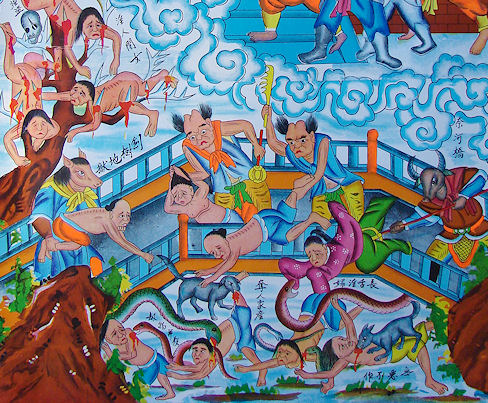
| Beneath it there are torrents of rushing red water on either side. |
桥下是红水横流的山涧。
Qiáo xià shì hóng shuǐ héngliú de shānjiàn. 橋下是紅水橫流的山澗。 |
| Looking ahead from half-way across they perceive that, written in large characters on a red cliff on the opposite side, |
由桥中向前一望,对岸的赤名岩上,
Yóu qiáo zhōng xiàngqián yīwàng, duì'àn de chì míng yán shàng, 由橋中向前一望,對岸的赤名巖上, |
| are the following lines: |
有斗大的粉字四行,写着:
yǒu dǒudà de fěn zì sì xíng, xiězhe: 有鬥大的粉字四行,寫著: |
| "To be human is easy, but to act human is hard. |
「为人容易做人难,
Wéirén róngyì zuòrén nán, 「爲人容易做人難, |
| Yet to be reborn human perhaps is harder still. |
再要为人恐更难。
Zài yào wéirén kǒng gèng nán. 再要爲人恐更難。 |
| For those who would be born again in happy state there is no great difficulty; |
欲生福地无难处,
Yù shēng fúdì wú nánchu, 欲生福地無難處, |
| It is only necessary to keep mouth and heart in harmony." |
口与心同却不难。」
Kǒu yǔ xīn tóng què bù nán." 口與心同卻不難。」 |
| When the spirits have read these words |
鬼魂们正在看读之时,
Guǐhún men zhèngzài kàn dú zhī shí, 鬼魂們正在看讀之時, |
| two huge demons jump out from the opposite shore |
对岸跳出又高又大的二个鬼,
duì'àn tiào chū yòu gāo yòu dà de èr gè guǐ, 對岸跳出又高又大的二個鬼, |
| and separately pass over the water surface |
分别扑到水面,
fēnbié pū dào shuǐmiàn, 分別撲到水面, |
| so frightening the spirits that they can scarcely stand. |
令两旁的鬼魂个个吓得站立不稳:
lìng liǎngpáng de guǐhún gègè xià dé zhànlì bùwěn: 令兩旁的鬼魂個個嚇得站立不穩: |
| One wears a black official hat with formal clothes and a brocade jacket; |
一个是头戴乌纱帽,身穿体面的礼服、锦袄。
Yī ge shì tóu dài wūshāmào, shēnchuān tǐmian de lǐfú, jǐn ǎo. 一個是頭戴烏紗帽,身穿體面的禮服、錦襖。 |
| in his hand he holds paper and writing brush, |
手拿着纸笔,
shǒu názhe zhǐbǐ, 手拿著紙筆, |
| and over his shoulder he carries a sharp sword. |
肩上插着利刀,
jiānshang chāzhe lìdāo, 肩上插著利刀, |
| with instruments of torture hanging at his waist. |
腰上挂着刑具,
yāo shàng guàzhe xíngjù, 腰上掛著刑具, |
| He fiercely glares from large, round eyes and laughs a horrid laugh. |
睁着圆滚滚的大眼睛,哈哈大笑。
zhēngzhe yuángǔngǔn de dà yǎnjing, hāha dàxiào. 睜著圓滾滾的大眼睛,哈哈大笑。 |
| His name is Short Life. |
他名叫“活无常”。
Tā míng jiào "Huó Wúcháng". 他名叫“活無常”。 |
| The other has a dirty face, smeared with blood; |
一个是面上污垢、流血,
Yī ge shì miànshang wūgòu, liúxiě, 一個是面上污垢、流血, |
| he wears a white coat, an abacus in his hand |
身穿白衫,手持算盘。
shēnchuān báishān, shǒuchí suànpán. 身穿白衫,手持算盤。 |
| and a rice sack over his shoulder. |
肩上背着米袋,
jiānshang bèizhe mǐ dài, 肩上背著米袋, |
| Round his neck hangs a string of paper money (burnt to the dead); |
胸前悬挂银纸钱,
xiōngqián xuánguà yínzhǐ qián, 胸前懸掛銀紙錢, |
| his brow contracts tightly, and he utters long sighs. |
愁眉紧锁,声声长叹。
chóuméi jǐnsuǒ, shēng shēng chángtàn. 愁眉緊鎖,聲聲長歎。 |
| His name is "Death Has a Part," |
他名叫“死有分”。
Tā míng jiào "Sǐ Yǒufèn". 他名叫“死有分”。 |
| The duty of these great demons is to push the shades |
此二大鬼,催促推落鬼魂们,
Cǐ èr dà guǐ, cuīcù tuī luò guǐhún men, 此二大鬼,催促推落鬼魂們, |
| off the bridge into the red water. |
落于红水横流之内。
luò yú hóng shuǐ héngliú zhīnèi. 落于紅水橫流之內。 |
| Those of a superficial nature rejoice at the prospect of being born once more as human beings; |
根器道行浅薄的,欢呼可以幸运地得生人身:
Gēn qì dào xíng qiǎnbó de, huānhū kěyǐ xìngyùn dì dé shēngrén shēn: 根器道行淺薄的,歡呼可以幸運地得生人身: |
| Those of a deeper nature weep and lament |
根器道行深厚的,则悲伤哭泣,
Gēn qì dào xíng shēnhòu de, zé bēishāng kūqì, 根器道行深厚的,則悲傷哭泣, |
| that in life they did not lay up a store of virtuous acts, |
自恨在世未修出世的功德,
zìhèn zàishì wèi xiū chūshì de gōngdé, 自恨在世未修出世的功德, |
| and thus pass away from the state of mortals for ever. |
以致痛苦的根身,身体难以断除。
yǐzhì tòngkǔ de gēn shēn, shēntǐ nányǐ duànchú. 以致痛苦的根身,身體難以斷除。 |
| Yet both male and female ghosts, as though drunk or mad, rush on |
男女鬼魂等,如醉如痴地,纷纷各依因缘,
Nánnǚ guǐhún děng, rú zuì rú chī dì, fēnfēn gè yī yīnyuán, 男女鬼魂等,如醉如癡地,紛紛各依因緣, |
| to be born again in any house where a woman is about to give birth |
投身各房舍中将生的胞胎之内。
tóushēn gè fángshè zhōngjiàng shēngdì bāotāi zhīnèi. 投身各房舍中將生的胞胎之內。 |
| The change from the land of the dead to that of the living is both stifling and murky. |
由于阴间、阳世的改变,气闷昏昏。
Yóuyú yīnjiān, yángshì de gǎibiàn, qìmèn hūnhūn. 由於陰間、陽世的改變,氣悶昏昏。 |
| And in the womb one's body is upside down and confined, with no room to move, |
再加上胎身颠倒,不能自由,
Zài jiāshàng tāi shēn diāndǎo, bùnéng zìyóu, 再加上胎身顛倒,不能自由, |
| so that both feet kick with force, trying to break out of the womb. |
于是双脚用力一踢,蹬破胞胎,奔出娘胎。
yúshì shuāngjiǎo yònglì yī tī, dēng pò bāotāi, bēn chū niángtāi. 於是雙腳用力一踢,蹬破胞胎,奔出娘胎。 |
| At last the sound of "Wah" is heard, and another life begins |
“哇”地一声落地,开始一生的形形色色。
"Wā" dì yī shēng luòdì, kāishǐ yīshēng de xíngxíng sèsè. “哇”地一聲落地,開始一生的形形色色。 |
| Because most people greedily seek the five desires and flavors |
一般众生,由于长久累月地贪好世间各种五欲、滋味;
Yībān zhòngshēng? yóuyú chángjiǔ lèi yuèdì tānhào shìjiān gè zhǒng wǔyù, zīwèi; 一般衆生,由於長久累月地貪好世間各種五欲、滋味; |
| and especially those associated with killing (e.g., meat) |
尤其杀生数多,
Yóuqí shāshēng shùduō, 尤其殺生數多, |
| they foolishly lose the buddha nature provided them at birth. |
迷失了重生本有的如来佛性。
míshī le chóngshēng běn yǒude Rúláifó xìng. 迷失了重生本有的如來佛性。 |
| They are ungrateful for the mercy of the Buddha, or of the Jade emperor, or for the instruction of the various gods |
辜负了佛恩,以及玉皇大帝,诸神明的训诫之恩,
Gūfù le fó ēn, yǐjí Yùhuáng Dàdì, zhū shénmíng de xùnjiè zhī ēn, 辜負了佛恩,以及玉皇大帝,諸神明的訓誡之恩, |
| They have not thought about how to lead better lives, let alone to become buddhas or bodhisattvas. |
从未想到如何做是善终,得成佛菩萨;
cóngwèi xiǎngdào rúhé zuò shì shànzhōng, dé chéngfó púsà; 從未想到如何做是善終,得成佛菩薩; |
| or about how to lead lives of evil, engaging the three bad ways, |
如何做会恶死,堕落三恶途;
rúhé zuò huì è sǐ, duòluò sān è tú; 如何做會惡死,墮落三惡途; |
| They pay no attention to the end that must overtake them; |
自己未来是怎样的结局,
Zìjǐ wèilái shì zěnyàng de jiéjú, 自己未來是怎樣的結局, |
| and finally, they bring themselves once more to the same horrid plight. |
致反复地造恶,
zhì fǎnfù dì zào è, 致反復地造惡, |
| with demons dragging along their bodies, |
终于又成为拖尸的鬼,枉为一世之人,
zhōngyú yòu chéngwéi tuō shī de guǐ wǎng wéi yīshì zhī rén, 終於又成爲拖屍的鬼,枉爲一世之人, |
| having wasted another incarnation. |
又将堕为无间地狱鬼魂。
yòu jiāng duò wéi wújiàn dìyù guǐhún. 又將墮爲無間地獄鬼魂。 |
| So the above lines about the Terrace of Drunken Oblivion |
以上二十二行,醧忘台下的书吏,
Yǐshàng èrshí èr xíng,Yùwáng Tái xiàde shūlì, 以上二十二行,醧忘臺下的書吏, |
| were respectfully submitted to the Jade Emperor |
恭谨附奏给玉皇大帝,
gōngjǐn fù zòu gěi Yùhuáng Dàdì, 恭謹附奏給玉皇大帝, |
| for inclusion in the Jade Guidebook, |
并编纂记载于玉历宝钞之中,
bìng biānzuǎn jìzǎi yú Yù Lì Bǎochāo zhīzhōng, 並編纂記載於玉曆寶鈔之中, |
| to be sent throughout the world so all might know them |
通行于凡间,令世人知悉,
tōngxíng yú fánjiān, lìng shìrén zhīxī, 通行于凡間,令世人知悉, |
| and might do good and eschew evil |
以从善去恶,
yǐ cóng shàn qù è, 以從善去惡, |
| and value precious human life. |
善待宝贵的人生。
shàndài bǎoguì de rénshēng. 善待寶貴的人生。 |
Return to top.
Print this page.
Go to
Court 10,
Contents,
Introduction